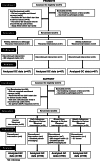Two Randomized Controlled Pilot Trials of Social Forces to Improve Statin Adherence among Patients with Diabetes
- PMID: 26585957
- PMCID: PMC4803690
- DOI: 10.1007/s11606-015-3540-y
Two Randomized Controlled Pilot Trials of Social Forces to Improve Statin Adherence among Patients with Diabetes
Abstract
Background: Medication nonadherence is an important obstacle to cardiovascular disease management.
Objective: To improve adherence through real-time feedback based on theories of how social forces influence behavior.
Design: Two randomized controlled pilot trials called PROMOTE and SUPPORT. Participants stored statin medication in wireless-enabled pill bottles that transmitted adherence data to researchers.
Participants: Adults with diabetes and a history of low statin adherence based on pharmacy refills (i.e., Medication Possession Ratio [MPR] <80% in the pre-randomization screening period).
Intervention: In PROMOTE, each participant was randomized to 1) weekly messages in which that participant's statin adherence was compared to that of other participants (comparison), 2) weekly summaries of that participant's statin adherence (summary), or 3) control. In SUPPORT, each participant identified another person (the Medication Adherence Partner [MAP]) to receive reports about that participant's adherence, and was randomized to 1) daily reports to MAP, 2) weekly reports to MAP, 3) reports to MAP only if dose was missed, or 4) control.
Main outcomes measure: Adherence measured by pill bottle.
Key results: Among 45,000 health plan members contacted by mail, <1% joined the trial. Participants had low baseline MPRs (median = 60%, IQR 41-72%) but high pill-bottle adherence (90% in PROMOTE, 92% in SUPPORT) during the trial. In PROMOTE (n = 201) and SUPPORT (n = 200), no intervention demonstrated significantly better adherence vs.
Control: In a subgroup of PROMOTE participants with the lowest pre-study MPR, pill-bottle-measured adherence in the comparison arm (89%) was higher than the control (86%) and summary (76%) arms, but differences were non-significant (p = 0.10).
Conclusions: Interventions based on social forces did not improve medication adherence vs. control over a 3-month period. Given the low percentage of invited individuals who enrolled, the studies may have attracted participants who required little encouragement to improve adherence other than study participation.
Keywords: interventions; medication adherence; social force; social support; statins.
Conflict of interest statement
Compliance with Ethical Standards Financial Support Funding for this study was provided by Merck, Sharpe, and Dohme Corp. The investigators had complete control over the recruitment procedures, data collection, data analysis, and presentation. Humana Inc. also provided support for the study by identifying potentially eligible members and mailing letters to those individuals. Conflict of Interest Kevin Volpp is a principal at the behavioral economics consulting firm VAL Health and has received consulting income and research support from CVS Health as well as research support from Humana, Weight Watchers, and the Vitality Institute (not related to Vitality, Inc., the manufacturer of the GlowCap pill bottle). Andrea Troxel has received consulting income from VAL Health and research support from the Vitality Institute and Weight Watchers. Jalpa Doshi has served as an advisory board member for Merck & Co., Inc., and has received research support from Humana, Pfizer, and Amgen. Peter Reese has received research support from CVS for studies of medication adherence. The other authors of this manuscript have no conflicts of interest to disclose.
Figures
Comment in
-
Capsule Commentary on Reese et al., Two Randomized Controlled Pilot Trials of Social Forces to Improve Statin Adherence Among Patients with Diabetes.J Gen Intern Med. 2016 Apr;31(4):416. doi: 10.1007/s11606-016-3599-0. J Gen Intern Med. 2016. PMID: 26892321 Free PMC article. No abstract available.
Similar articles
-
Patient and Partner Feedback Reports to Improve Statin Medication Adherence: A Randomized Control Trial.J Gen Intern Med. 2017 Mar;32(3):256-261. doi: 10.1007/s11606-016-3858-0. Epub 2016 Sep 9. J Gen Intern Med. 2017. PMID: 27612487 Free PMC article. Clinical Trial.
-
Partners and Alerts in Medication Adherence: A Randomized Clinical Trial.J Gen Intern Med. 2018 Sep;33(9):1536-1542. doi: 10.1007/s11606-018-4389-7. Epub 2018 Mar 15. J Gen Intern Med. 2018. PMID: 29546659 Free PMC article. Clinical Trial.
-
The Habit Formation trial of behavioral economic interventions to improve statin use and reduce the risk of cardiovascular disease: Rationale, design and methodologies.Clin Trials. 2019 Aug;16(4):399-409. doi: 10.1177/1740774519846852. Epub 2019 May 31. Clin Trials. 2019. PMID: 31148473 Free PMC article.
-
Patient-Centered Interventions to Improve Adherence to Statins: A Narrative Synthesis of Systematically Identified Studies.Drugs. 2016 Oct;76(15):1447-1465. doi: 10.1007/s40265-016-0640-x. Drugs. 2016. PMID: 27677773 Free PMC article. Review.
-
Strategies aiming to improve statin therapy adherence in older adults: a systematic review.BMC Geriatr. 2024 May 21;24(1):444. doi: 10.1186/s12877-024-05031-z. BMC Geriatr. 2024. PMID: 38773394 Free PMC article.
Cited by
-
Patient and Partner Feedback Reports to Improve Statin Medication Adherence: A Randomized Control Trial.J Gen Intern Med. 2017 Mar;32(3):256-261. doi: 10.1007/s11606-016-3858-0. Epub 2016 Sep 9. J Gen Intern Med. 2017. PMID: 27612487 Free PMC article. Clinical Trial.
-
Nonadherence in the Learning Healthcare System: Avoiding a Mountain by Seeing the Bumps.Circ Cardiovasc Qual Outcomes. 2017 Oct;10(10):e004283. doi: 10.1161/CIRCOUTCOMES.117.004283. Circ Cardiovasc Qual Outcomes. 2017. PMID: 29021335 Free PMC article. No abstract available.
-
Partners and Alerts in Medication Adherence: A Randomized Clinical Trial.J Gen Intern Med. 2018 Sep;33(9):1536-1542. doi: 10.1007/s11606-018-4389-7. Epub 2018 Mar 15. J Gen Intern Med. 2018. PMID: 29546659 Free PMC article. Clinical Trial.
-
Social support via Internet communication technology for diabetes self-management: a scoping review.Mhealth. 2024 Apr 12;10:18. doi: 10.21037/mhealth-23-34. eCollection 2024. Mhealth. 2024. PMID: 38689617 Free PMC article.
-
Remote Blood Pressure Monitoring With Social Support for Patients With Hypertension: A Randomized Clinical Trial.JAMA Netw Open. 2024 Jun 3;7(6):e2413515. doi: 10.1001/jamanetworkopen.2024.13515. JAMA Netw Open. 2024. PMID: 38829618 Free PMC article. Clinical Trial.
References
Publication types
MeSH terms
Substances
Grants and funding
LinkOut - more resources
Full Text Sources
Other Literature Sources
Medical




